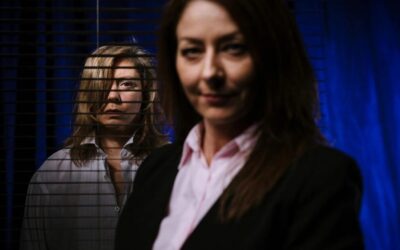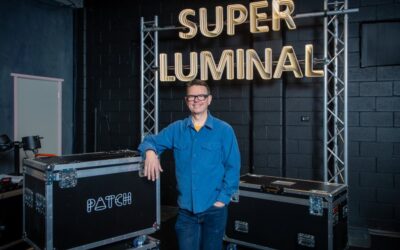Gothic drama enthusiasts are in for absolute treat later this month as Malthouse Theatre prepares the unveiling of Nosferatu. An atmospheric work based on the 1922 silent German Expressionist horror film, Nosferatu: A Symphony of Horror, playwright Keziah Warner takes the original and makes it her own.
“I like to write things I haven’t seen on stage too much, and I’ve never seen vampires live,” says Warner about the Malthouse commissioned work. “And I’m interested in entertainment. Maybe that doesn’t sound too artistic, but I really want the audience to have a good time, and to maybe attract people who don’t normally go to the theatre. I think genre really helps to do that.”
Warner, who loved the film and thought it could be incredible on stage and in an Australian context, does indeed take us to the familiar.
“Yes, the isolation of Tasmania for sure, says Warner about why she chose this state. “Anything to set a spooky scene. But the main basis for me was that Tasmanian gothic is particularly concerned with environmental degradation – those iconic examples of loss: the tiger, the devil and further, deforestation, mining, salmon farming. And in Nosferatu, the vampire is particularly identified as having a connection to the cursed earth he was buried in, drawing his strength from it.” Warner liked the idea of cursed earth, and what that means from an environmental standpoint. “The cost of our destruction of the earth and who is still gaining from it felt very contemporary.”
Thematically, the climate crisis as well as the destruction of capitalism and the willingness to turn a blind eye if we’re benefitting are high on the list. But, Warner acknowledges, it’s also about death and grief. “That felt important post-pandemic especially. It’s a horror and there’s violence and murder, but it was important to me to see the effects of that on the people left behind. It’s not a slasher like kill and move on, there’s fallout too.”
Based on a work over 100 years old, I was interested to know what elements of the original had inspired the work with the creeping unease of the original having been a vital underpinning. “It’s not scary like we think of films now but it is consistently uncomfortable, even disquieting,” says Warner who has tried to keep that tone here. “Humour is very important too. There’s some humour in the original which is intentional, and some which is just the result of very old special effects and German expressionist acting style, but I love it either way. I think the best way to open people up is to make them laugh, so we have lots of jokes, and then the tragedy can really get to you. We venture pretty far off book pretty quick, but there are a few direct references and easter eggs – to the film, but also other works in the vampire canon – that I hope fans will enjoy.”
The story of Nosferatu is similar to that of Dracula and many of the characters remain the same, however Count Dracula is renamed Count Orlok, and it is this character that has the job of driving the atmosphere, the suspense and influence over others.
“The vampire, Orlok, doesn’t act like a human. His conversation is strange and off kilter, he’s charming one minute and impatient the next, seductive, then violent,” explains Warner. ” And once he’s on stage he really is the centre of gravity. Even when he’s not onstage, his presence is felt in the behaviour of others. Bridget (Balodis, director) and Jacob (Collins-Levy, playing Orlok) have done an incredible job with this character – Jacob talks and moves like a different species – it’s remarkable. And Bridget has a rigour with the physicality of her directing that differentiates the humans from the non, the stillness, their rhythms. I’ve very grateful to them!
I guess the other thing to say is that there is a certain amount of wish fulfilment in writing a show like this. There’s enjoyment for an audience in seeing the tropes play out. And they all know he’s a vampire long before the characters do. So I’ve tried my best to keep the plot unexpected. Not everyone reacts in the way you might expect, some vampire lore is adhered to and some isn’t, not everything is quite as it seems.”
The project sounds complex but Warner admits that the whole process of writing was super quick. – less than two years from initial pitch to closing night! “Writing a supernatural character is very difficult – to make them engaging without humanising them too much, or falling into stereotypes too much, ” she says. ” And like I said, satisfying the tropes without it all becoming predictable. You have to make bold choices sometimes. Not everyone will like it but that’s ok.”
One of the most joyous memory for Warner during this period was doing a workshop with actors in lockdown before she’d even finished a first draft. “The Because the Night actors were all in lockdown too of course and working on script developments instead, ” she says. “And we had so much fun with this raw and bloody half-story. To have actors of that calibre read my messy first two acts and then have them all be super into it and give such engaged and incredible feedback. That kept me going for the next twelve months.”
Warner is an alumna of Melbourne Theatre Company’s Women in Theatre Program, Malthouse Theatre’s Besen Family Artist Program, Red Stitch Actors’ Theatre’s INK Program, Playwriting Australia’s Post-Production Program, and Soho Theatre’s Writer’s Lab, UK.
She has won Sydney Theatre Company’s Patrick White Playwrights Award, been shortlisted for the Griffin Award, the Martin-Lysicrates Prize, the Rodney Seaborn Playwrights Award and the Max Afford Award, and longlisted for Soho Theatre’s Young Writers Award.
Her credits include POONA (Next Wave, 2021), CONTROL (Red Stitch Actor’s Theatre, 2019), HELP YOURSELF (MTC’s Cybec Electric, 2019), LUNA (VCA, 2019), and HER FATHER’S DAUGHTER (Hotel Now, 2018).
As a playwright Warner is not sure yet about what types of stories she likes to tell but does have a love for genre and writing things she doesn’t see much. She admits to there being a bit of menace and usually a bit of romance and melancholy in her work. “I don’t have an overarching politics in my work, but I think the ways we communicate or fail to are pretty fascinating.”
With this one, Warner wants audiences a little unsettled and maybe a little complicit but ultimately wants people to have a good time. “It’s sexy, it’s scary, the actors are incredible and there is so much blood,” she says of her modern day take on a classic Gothic tale.
Be careful who you let through your door or you might get more than you’d bargained for. So long as you’re not the one in danger, it’s easy to turn a blind eye to the horrors on your doorstep.
Just keep telling yourself, everything is fine.
February 10 – March 5
malthousetheatre.com.au




